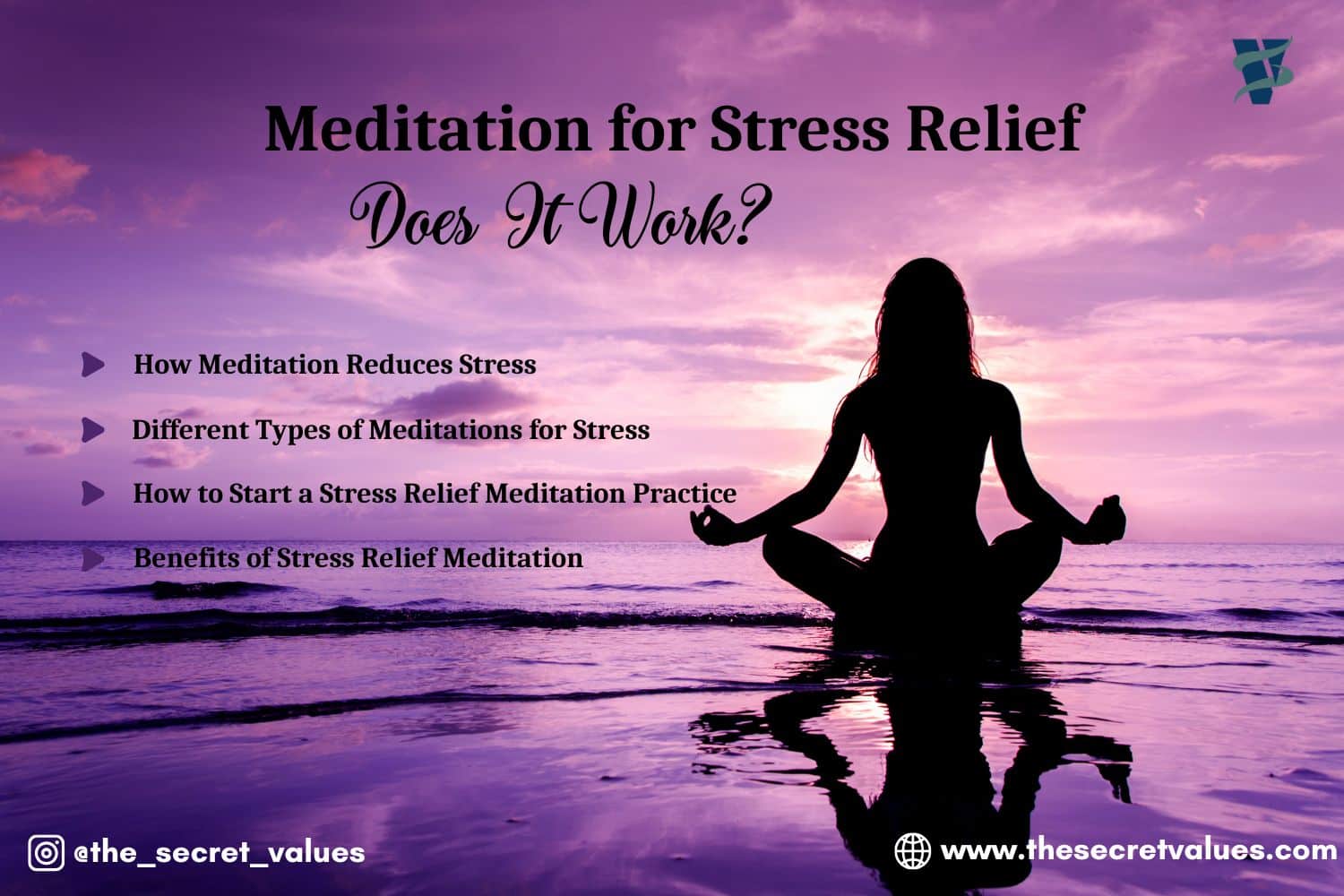Stress has become a frequent companion in modern times, affecting our well-being and productivity. Many people use meditation to relieve stress and get back control over their lives. However, is it effective, or is it an occasional trend? This blog will explore the science behind and practice of meditation, the reasons it’s an effective stress-reduction method, and the best way to integrate it into your daily routine.
Understanding Meditation for Stress Relief
Meditation is an ancient practice that involves attentive concentration of the mind over a particular thought, sound, or emotion. Practising regularly will keep the mind chatter that leads to stress levels at a minimum. Research studies have repeatedly indicated that meditation is effective in calming down and reducing the amount of cortisol (the hormone that induces stress) in the body and enhancing the acuity of the mind. Unlike other stress-relieving meditation exercises, meditation does not demand the use of special equipment or lengthy periods. It is a practical method for anyone.
How Meditation Reduces Stress
Calming the Mind
Meditation allows you to stop and take some deep breaths, which stimulates your parasympathetic nervous system. The result is a decreased level of the fight or flight reaction, which lowers anxiety and physical tension.
As an illustration, stress-relaxation guided meditations can take you through relaxing images and control exercises, which reduce your pulse and blood pressure.
Improving Emotional Regulation
Regular meditation strengthens the prefrontal cortex—the part of the brain associated with decision-making and emotional control. As a result, you can better manage emotional triggers and stressful situations.
Creating Mindful Awareness
Stress often stems from worrying about the future or dwelling on the past. Mindfulness meditation helps you focus on the present moment, reducing negative thought patterns.
Increasing Resilience
Over time, stress-reduction meditation increases resilience, which reduces your reactivity to stress. The more you practice stress-relieving meditation, the more adept you get at staying composed under pressure.
Different Types of Meditations for Stress

Mindfulness Meditation
- Focuses on observing thoughts and emotions without judgment.
- It is suitable for beginners as it only requires you to sit quietly and focus on breathing.
Guided Meditation
- It involves listening to a narrator or teacher who leads you through visualisations and relaxation exercises.
- It is ideal for those who struggle with self-guided meditation.
Transcendental Meditation
- Uses specific mantras to achieve a deep state of relaxation.
- It requires a trained instructor but offers profound stress-relieving benefits.
Body Scan Meditation
- It focuses on relaxing each part of your body, gradually releasing tension.
- Effective for managing physical symptoms of stress, such as muscle tightness.
Loving-Kindness Meditation
- It involves directing positive thoughts and compassion toward yourself and others.
- It helps reduce anger and stress caused by interpersonal conflicts.
How to Start a Stress Relief Meditation Practice
Choose a Quiet Space
Find a peaceful environment where you won’t be interrupted.
Set a Time
Start with 5–10 minutes daily and gradually increase the time as you become more comfortable.
Use a Comfortable Posture
Sit in a chair or on the floor with your back straight. You can also lie down if you prefer.
Focus on Your Breath
Take slow, deep breaths. Pay attention to the rhythm of your inhalations and exhalations.
Be Consistent
Consistency is key. Daily meditation helps establish it as a habit, amplifying its stress-relieving benefits.
Benefits of Stress Relief Meditation
Meditating regularly has far-reaching benefits, both mental and physical.
Mental Benefits
- Reduces symptoms of anxiety and depression.
- Improves concentration and productivity.
- Enhances emotional stability.
Physical Benefits
- Lowers blood pressure.
- Reduces muscle tension and fatigue.
- Improves sleep quality.
Long-Term Benefits
- Better resilience to future stressors.
- Increased overall happiness and life satisfaction.
Tips for Staying Motivated
- Join a Community: Group meditations for stress can encourage and help you stay accountable.
- Use Apps: Apps like Headspace or Calm offer guided meditations and tracking tools.
- Reward Yourself: Celebrate milestones, such as meditating for seven consecutive days.
FAQs on Meditation for Stress Relief
- Can anyone meditate to relieve stress?
Yes! Meditation is a versatile practice suitable for all ages and backgrounds.
1. How long will it take to see results?
While some feel immediate relaxation, consistent practice over weeks leads to noticeable stress reduction.
2. Do I need a teacher?
Although having a teacher can help, self-guided meditation or online resources are excellent starting points.
3. What if I can’t stop my thoughts?
It’s normal for your mind to wander. Acknowledge the thought and refocus your attention on your breath or mantra.
Final Thoughts
Stress-reduction meditation is a scientifically-proven, provenly beneficial practice, rather than merely a health trend. Being regular is fundamental, regardless of how you prefer to meditate —whether guided, mindful, or otherwise. Begin small, learn to be self-compassionate, and observe changes in your life.
Once you make stress-reducing meditation a part of your daily ritual, you will be better equipped to manage stress and live a less stressful, more rested, focused, and happier life.
Be aware: Your mental well-being is just as important as your health. Consider meditation as your regular stress-reducing buddy.








22 thoughts on “Meditation for Stress Relief: Does It Work?”